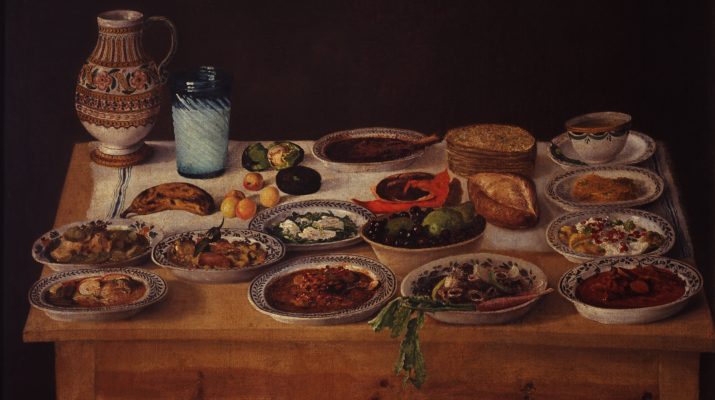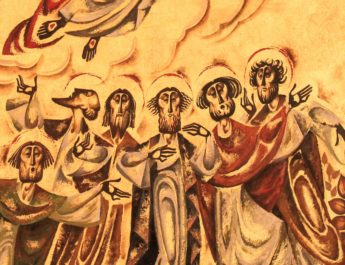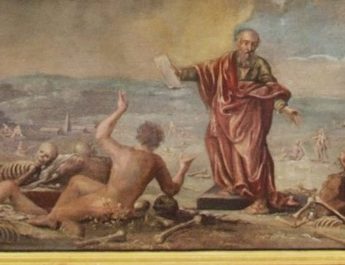Isaiah 25:1-9
Proper 23A
1 O Lord,A you are my God;B
I will exaltC you, I will praiseD your name;E
A “Lord” = YHVH. From havah (to be, become) or hayah (to come to pass, become, be). This is the name of the God of Israel, the self-existent and eternal one, the tetragrammaton. This pronunciation has been lost to time so “Lord” is generally used in its place.
B “God” = Elohim.
C “exalt” = ramam. 7x in OT. This is to rise in a literal or figurative sense. So, it can be to get up or exalt.
D “praise” = yadah. From yad (hand). This is to throw one’s hands into the air in a gesture of praise. So, it is to praise, give thanks, or make a confession.
E “name” = shem. May be from sum (to put, place, set). This is name, fame, renown. A name was thought to indicate something essential about a person – something about their individuality. So, this word can also mean honor, authority, or character.
for you have done wonderfulF things,
plansG formed of old,H faithfulI and sure.J
F “wonderful” = pele. 13x in OT. This is a wonder, marvelous thing, or a miracle.
G “plans” = etsah. From yaats (to counsel, advise, determine). This is advice, purpose, plan, prudence, or counselor.
H “of old” = rachoq. From rachaq (to widen, become distant, cast, or remove in a literal or figurative sense). This is distant or far, whether of space or of time.
I “faithful” = emunah. From aman (to believe, endure, fulfill, confirm, support, be faithful, put one’s trust in, be steadfast. Figuratively, this is to be firm, steadfast, or faithful, trusting, believing, being permanent, morally solid). This word is literally firmness, but figuratively fidelity, faithfulness, honesty, responsibility, trust, truth, steadfastness. This word shares a root with the word “Amen.”
J “sure” = omen. Related to “faithful” in v1. 1x in OT. From aman (see note I above). This is faithfulness or truth.
2 For you have made the cityK a heap,L
the fortifiedM cityN a ruin;O
K “city” = iyr. From uwr (to awaken or wake oneself up). This can mean excitement in the sense of wakefulness or city. Properly, this is a place that is guarded. Guards kept schedules according to watches. This sense of the word would include cities as well as encampments or posts that were guarded.
L “heap” = gal. From galal (to roll, roll away, wallow, commit, remove; rolling in a literal or figurative sense). This is a wave, billow, rock pile, something rolled, a spring of water.
M “fortified” = batsar. This is to enclose, wall up, or make something inaccessible, impenetrable, isolated. It can also mean to fortify, something mighty. It can also mean to gather grapes.
N “city” = qiryah. From qarah (to happen, meet, bring about). This is a place where there are buildings so it could be a fortress or a town.
O “ruin” = mappalah. 3x in OT –in Isaiah 17, 23, and 25. From naphal (to fall, literal or figurative; death, calamity, wasting away). This is something that falls so it would be ruinous.
the palaceP of aliensQ is a city no more,
it will neverR be rebuilt.S
P “palace” = armon. Root might mean to be high in elevation. So, this is any kind of fortified building like a citadel, castle, tower, or palace.
Q “aliens” = zuwr. This is one who comes from someone else – a stranger. It is one who stops for lodging. Figuratively, it can also mean profane or one who commits adultery.
R “never” = olam + lo. Olam is a long scope of time whether in the past (antiquity, ancient time) or in the future (eternal, everlasting).
S “rebuilt” = banah. This is to build, make, set up, restore, repair, or obtain children. It is to build literally or figuratively.
3 Therefore strongT peoplesU will glorifyV you;
T “strong” = az. From azaz (to be strong, become fixed, be bold, prevail, be impudent; it means to be stout literally or figuratively; a Late Hebrew word). This is strong or mighty. It can also refer to power or vehemence or mean greedy.
U “peoples” = am. From amam (to darken, hide, associate; creating shadows by huddling together). This is people or nation. It can be used specifically for a tribe, collectively of troops or armies, or figuratively to refer to a flock of animals.
V “glorify” = kabad. To be heavy, weighty, or severe. It can also be positive abounding in, rich, or honorable. The Hebrew word for “glory,” kabod, is taken from this root.
citiesW of ruthlessX nationsY will fearZ you.
W “cities” = qiryah. Same as “city” in v2. See note N above.
X “ruthless” = arits. From arats (to tremble, dread, stand in awe, oppress, harass). This is awe-inspiring or terror-inducing, ruthless, tyrant, oppressor, violent, powerful.
Y “nations” = goy. From the same root as gevah (the back, person, or body); related to gev (among); related to gaah (to rise up). This is nation or people. Often used to refer to Gentiles or foreign nations. It can also be used figuratively for a group of animals. This is where the Yiddish “goy” comes from.
Z “fear” = yare. This is to fear, be afraid, dreadful. It can also refer to fearful reverence – to fear in a moral sense is to say to revere, respect.
4 For you have been a refugeAA to the poor,BB
a refuge to the needyCC in their distress,DD
AA “refuge” = maoz. Perhaps related to “strong” in v3. From uz (to run for refuge, to seek safety, be strong) OR from azaz (see note T above). This is a defense, refuge, safety, fortress, rock, strength, or stronghold. It is somewhere one goes to be safe and protected or something one uses to be safe. Figuratively, it could be a defense or a force.
BB “poor” = dal. From dalal (to be low, hang, fade, be emptied, become poor, be oppressed). This is lean, weak, needy, poor. Properly, it is one who is dangling.
CC “needy” = ebyon. From abah (to consent, obey, want, yield, accept). This is needy, poor, beggar. Someone who is wanting.
DD “distress” = tsar. From tsarar (to bind, restrict, narrow, be cramped, an adversary). Properly, this is a narrow or constricted place. Figuratively, it can be trouble, a pebble, an enemy, anguish, or distress.
a shelterEE from the rainstormFF and a shadeGG from the heat.HH
EE “shelter” = machaseh. From chasah (to take refuge or flee for protection; figuratively, to hope or trust in someone or something). This is a shelter in a literal or figurative sense. It is refuge or place of refuge. It could also be hope or trust.
FF “rainstorm” = zerem. 9x in OT. From zaram (to flood, pour; to carry something off as a flood does). This is a rainstorm, overflowing, flood from rain, tempest.
GG “shade” = tsel. From tsalal (to be or become dark, shade; this is the shade as during twilight or shadow as associated with something opaque). This is shade in a literal or figurative sense. So, it could be shadow, shade, protection, shelter, or defense.
HH “heat” = choreb. 16x in OT. From chereb (any sharp instrument like a sword, dagger, axe, or mattock); from charab (to dry up because of drought, destroy, or make waste, kill). This is drought, heat, desolation.
When the blastII of the ruthless was like a winterJJ rainstorm,
5 the noiseKK of aliens like heat in a dry place,LL
II “blast” = ruach. This is breath, wind, air, cool, spirit. This is wind, which resembles the breath and so this can be used figuratively for life itself or being frail/mortal/impermanent. It can refer to the air of the sky or the spirit.
JJ “winter” = qir. Perhaps from qur (to dig, destroy, wall up). This is a wall, ceiling, surface, mason, or town.
KK “noise” = shaon. 18x in OT. From shaah (to crash, rumble, rush, be desolate, devastate). This is a crash, loud sound, clamor, rumbling, destruction. It could also be the sound of rushing water.
LL “dry place” = tsayon. 2x in OT. From the same as tsiyyah (dryness or parched; drought, dry places, a solitary place or a wilderness). This is dryness, drought, desert, or parched ground.
you subduedMM the heat with the shade of clouds;NN
the songOO of the ruthless was stilled.PP
MM “subdued” = kana. This is to be humble, subdue, humiliate, conquer. Properly, it means to bend the knee.
NN “clouds” = ab. Perhaps from uwb (to be a think or dark cloud, a cloud covering). This is a dark or thick cloud that can envelope in darkness. It can also refer to a copse or to clay.
OO “song” = zamir. 7x in OT. From zamar (making music; used specially of music to worship God; music with singing, singing praise, singing psalms); may be from zamar (to trim or prune). This is a song, psalm, or other music accompanied with instruments.
PP “was stilled” = anah. This is answer, respond, announce, sing, shout, or testify. It means to pay attention, which implies responding and, by extension, starting to talk. Used in a specific sense for singing, shouting, testifying, etc.
6 On this mountain the Lord of hostsQQ will make for all peoples
a feastRR of rich food,SS a feast of well-aged wines,TT
of rich food filled with marrow,UU of well-aged wines strained clear.VV
QQ “hosts” = tsaba. From tsaba (to wage war, serve, assemble, fight, perform, muster, wait on). This is a large group of persons (used figuratively for a group of things). It implies a campaign literally as with army, war, warfare, battle, company, soldiers. Can also be used figuratively for hardship or for worship.
RR “feast” = mishteh. From shathah (to drink literally or figuratively; a drinker). This is drink or the act of drinking. So it is a feast or banquet, as occasions with drinking.
SS “rich food” = shemen. From shamen (to shine, which implies being oily, growing fat). This is fat, oil, grease, olive oil – often with perfume. Used figuratively for fertile, lavish, rich.
TT “well-aged wines” = shemer. 5x in OT. Perhaps from shamar (to keep, watch, or preserve; to guard something or to protect it as a thorny hedge protects something). This is the dregs or settling of wine, a sprit, or aged wine (perhaps as preserved).
UU “filled with marrow” = machah. This is to rub or wipe away, which implies blotting out or erasing, which can be used to mean destroy. This can also be rub in the sense of rubbing oil or grease on something or, more generally, reaching or touching.
VV “strained clear” = zaqaq. 7x in OT. This is to refine, purify, or distill. Figuratively, it can mean to extract.
7 And he will destroyWW on this mountain
the shroudXX that is castYY over all peoples,
the sheetZZ that is spreadAAA over all nations;
WW “destroy” = bala. This is to swallow, engulf, cover, or destroy.
XX “shroud” = paneh + lot. Paneh is from panah (to turn, appear). This is a face in a literal or figurative sense. Lot is 1x in OT. From lut (to envelop or cast – refers to something that is tightly wrapped). This is a covering or veil.
YY “cast” = lut. Related to “shroud” in v7. 3x in OT. See note XX above.
ZZ “sheet” = massekah. From nasak (to cover, pour out, offer; by analogy anointing a king). This is a pouring out or over. So it could be pouring molten metal to cast an image, making a libation (pouring out a drink offering), or otherwise covering.
AAA “spread” = nasak. Perhaps related to “sheet” in v7. 1x in OT. Perhaps from nasak (see note ZZ above). This is to weave, stretch, or spread over.
8 he will swallow upBBB death forever.CCC
Then the LordDDD God will wipe awayEEE the tears from all faces,
BBB “swallow up” = bala. Same as “destroy” in v7. See note WW above.
CCC “forever” = netsach. From natsach (something that glitters from a distance or stands out, excels, has status/standing; also to be permanent or enduring). This is properly a goal or destination as the bright focus to which one journeys. It can be splendor, truthfulness, or confidence. Most often, it refers to everlastingness, always, continually.
DDD “Lord” = Adonai. From adon (lord, master, owner); root means to rule or be sovereign. This is the actual Hebrew word for Lord used (in a different form) of humans and (in the present form) of God. It means someone who is in control.
EEE “wipe away” = machah. Same as “filled with marrow” in v6. See note UU above.
and the disgraceFFF of his people he will take awayGGG from all the earth,HHH
for the Lord has spoken.
FFF “disgrace” = cherpah. From charaph (to expose and so figuratively to reproach, defame, carp at, defy). This is reproach, rebuke, shame, or disgrace. It can also refer to genitals.
GGG “take away” = sur. This is to turn aside in a literal or figurative sense – to depart, decline, rebel, remove, or withdraw.
HHH “earth” = erets. Root may mean to be firm. This is earth, ground, field land, or country.
9 It will be said on that day,
Lo,III this is our God;JJJ we have waitedKKK for him, so that he might saveLLL us.
III “lo” = hinneh. From hen (lo! Behold! If, though; an expression of surprise). This is to draw attention, show suddenness or surprise, or to emphasize the importance of the coming statement. See! Lo! Behold!
JJJ “God” = Elohim. Same as “God” in v1. See note B above.
KKK “waited” = qavah. It can mean to bind or gather together, especially in the sense of twisting together. In that light, it can mean collect. Figuratively, this can mean to wait, await, expect, or tarry.
LLL “save” = yasha. To deliver, defend, help, preserve, rescue, be safe. Properly, to be open, wide or free, which implies being safe. Used causatively, it means to free.
This is the Lord for whom we have waited;
let us be gladMMM and rejoiceNNN in his salvation.OOO
MMM “be glad” = gil. Properly, this is twirling around because of a strong feeling whether of rejoicing or from fear. This can be rejoice, be glad or joyful, or to cry.
NNN “rejoice” = samach. This is to rejoice or be glad. Properly, it is to brighten up in a literal or figurative sense.
OOO “salvation” = yeshuah. Related to “save” in v9. From yasha (see note LLL above). This is salvation, deliverance, health, victory, prosperity.
Image credit: “Puebla Kitchen” by anonymous artist.




